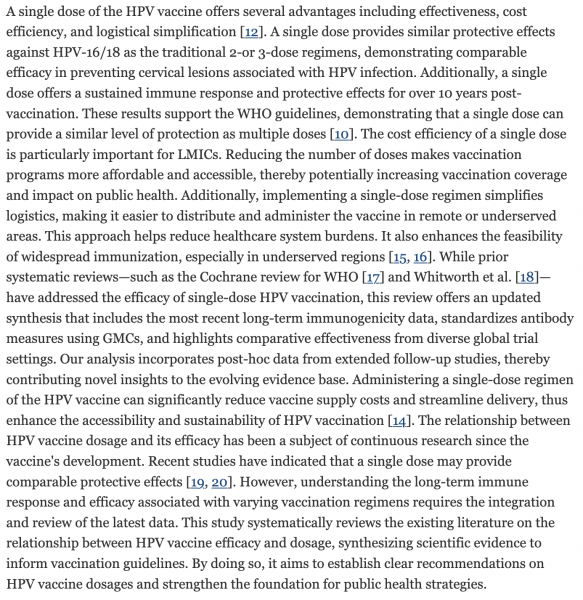impf-info.de
HPV - erneut bestätigt: wenn überhaupt, reicht EINE Impfdosis
Sollte, aus welchen Gründen auch immer, eine HPV-Impfung erwogen werden, gibt es mittlerweile eine überwältigende Studienlage, die belegt, dass, abweichend von der STIKO-Empfehlung, anhaltend hohe Antikörperspiegel und ein anhaltender Schutz vor HPV 16/18 mit nur einer Impfdosis sicher zu erreichen sind.
Dies bestätigt erneut eine systematische Übersichtsarbeit über die neuesten randomisierten Studien, die im renommierten Journal BMC erschien. Die gemessenen Antikörpertiter waren nach der Ein-Dosis-Strategie zwar niedriger als bei einer Zwei- oder Drei-Dosis-Impfung, erreichten aber immer noch zuverlässig den als schützend angesehenen Bereich - die Autoren resümieren: "This systematic review confirms that single-dose HPV vaccination, despite lower antibody concentrations, provides substantial protection."
Aus der kinder- und jugendärztlichen Beratungspraxis ist ein wesentlicher Aspekt dieser Ergebnisse, dass damit eine eventuelle Impfentscheidung von jeder jungen Frau selbstständig am Beginn ihrer sexuellen Aktivität getroffen werden kann und nicht - wie nach der STIKO-Empfehlung notwendig - Eltern entscheiden müssen, ihre neunjährigen Töchter gegen Geschlechtskrankheiten zu impfen.
Comparative effectiveness and immunogenicity of single-dose and multi-dose human papillomavirus vaccination: a systematic review | BMC Public Health | Full Text
By accepting you will be accessing a service provided by a third-party external to https://impf-info.de/

